Flies are pesky pests that seem to be everywhere we go. Sometimes, we wonder how they were able to enter our house, especially during summer.
There are over 100,000 fly species around the world. Most of them have the same habitat and feeding habits. Meanwhile, their life expectancy mainly depends on the weather.
How long do flies live? Flies can live from 15 to 30 days during summer. But during colder months, they can live up to 90 days, provided that they have sources of food. Without food and water, most fly species will die of starvation within 2-3 days. But without air, they may die of suffocation within eight hours.
Aside from being very disgusting insects, flies can contaminate our food. Most of them also transmit diseases to humans.
Not to mention, flies are quite hard to catch. In this article, you will learn the life cycle of flies, their benefits to the environment, and how to get rid of them.
Table of Contents
Life Cycle of a Fly
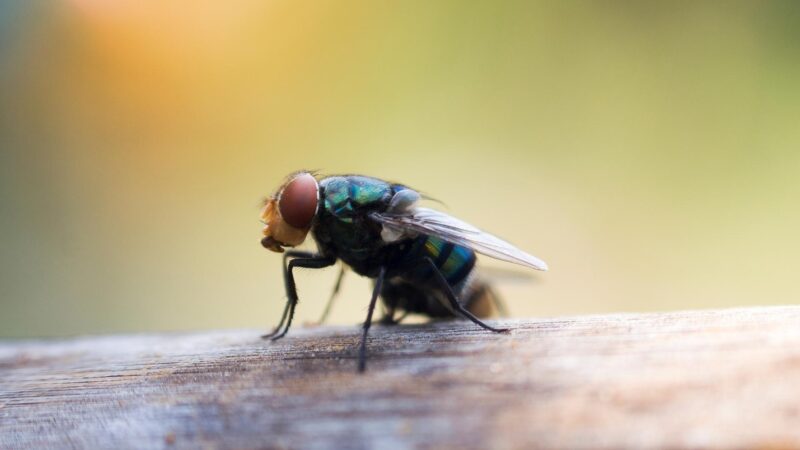
All fly species undergo complete metamorphosis, which means they pass through four life stages – egg, larva, pupa, and adult.
These eggs are usually deposited in wet, rotting organic matter such as lawn clippings, waste grains, human and animal manure, decaying fruits and vegetables, and garbage.
Under favorable conditions, a female fly can lay between 350 and 900 eggs in her lifetime and 100-150 eggs at a time. Within 12 days, eggs hatch into larvae, also called maggots.
Fly larvae pass through 3 larval stages, which last between 3 and 7 days. During these stages, they will feed on their breeding site.
Once these maggots mature, they will move to a dry place to pupate. The pupal stage of flies usually lasts between 3 days and 1 month. Normally, the life cycle of a fly is completed in just 3 to 7 days.
There are 10-12 generations in temperate regions in a year but can reach up to 20 in subtropical and tropical regions.
What Is the Purpose of a Fly?
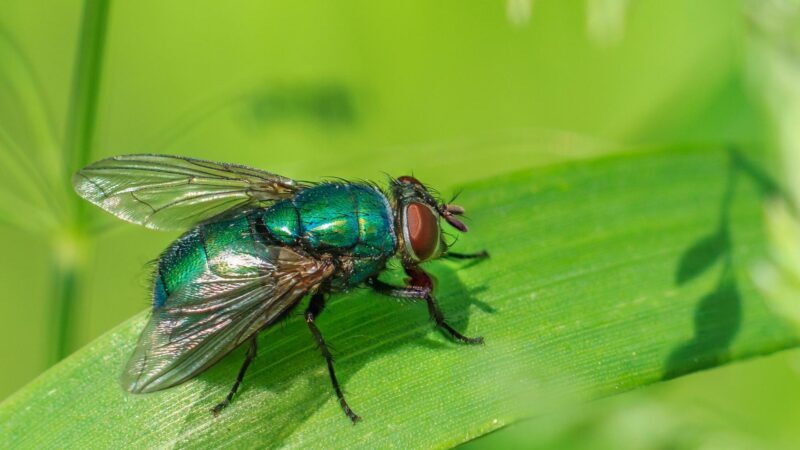
We all know that houseflies are very annoying pests and are vectors of several diseases. But despite their negative image, flies, in general, have very interesting benefits to the ecosystem.
So before using that fly swatter, here are some of the positive purposes of flies in the environment that you never thought they have:
1. Flies Are Both Predators and Prey
The friendly fly (Sarcophaga aldrichi) is an important predator of cocoons of forest tent caterpillars. Robber flies (Asilidae) prey on garden pests such as wasps and crickets.
As prey, flies are common foods of a wide variety of animals, including spiders and frogs. They are also being used as bait for fishing.
2. Flies Are Keen Decomposers
Flies consume decaying organic matter. In doing so, they break down manure into small pieces of components and decompose them. They release nutrients into the soil so that plants can use them.
In short, flies help in completing the food chain. Flies also help us in dealing with garbage and dead animals.
3. Flies Are Great Pollinators
Interestingly, some fly species, such as flower flies (Syrphidae), are also great pollinators and are ideal alternatives for bees and wasps.
Also known as hoverflies, Syrphid flies may not be as hairy as bees, but they visit flowers regularly to pollinate. Bee flies or humbleflies (Bombyliidae) are also efficient pollinators.
4. Blow Flies Are Surgical Maggots
Sterilized maggots of blow flies (Calliphoridae) were used to treat wounded soldiers during the American Civil War (1861–65) and in World War I.
This medical process is called maggot debridement therapy (MDT), and it is now being used worldwide. MDT is clinically-approved, but don’t try this at home.
5. Blow Flies Can Detect Chemical Weapons
Aside from medical purposes, blow flies are also capable of detecting chemical warfare agents.
According to a study, these flies can store some vital information in their guts once they taste the stimulants used in creating chemical weapons. The researchers then used a mass spectrometer to identify those chemicals.
6. Blow Flies Can Help Solve Crimes
According to research, analyzing the blow flies found at a crime scene can help forensic scientists determine to know how long a body of a murder victim has been dead before it was buried.
Amazingly, these fly species can also provide evidence of whether a corpse has been transferred from one burial site to another.
Should You Kill House Flies?
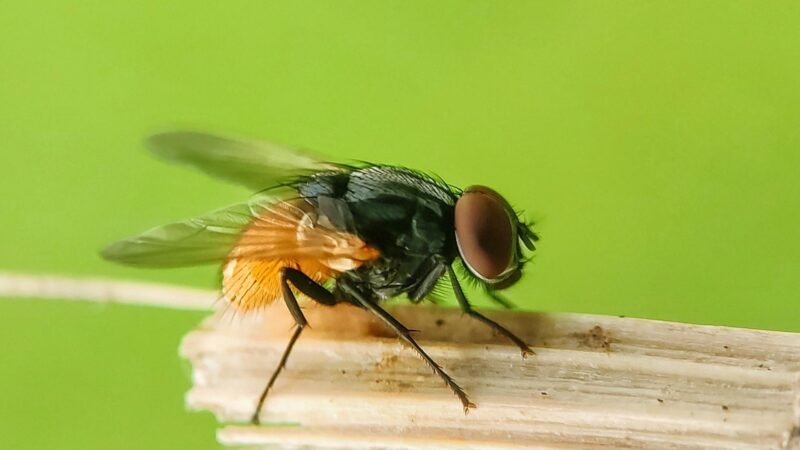
You should without any doubt kill house flies. In fact, you should kill them immediately because they reproduce very fast. In doing so, you should not only focus on adult flies but maggots as well.
But while breaking their life cycle is very important, giving them no reason to populate is a better preventive measure.
What Causes a Lot of Flies in the House?
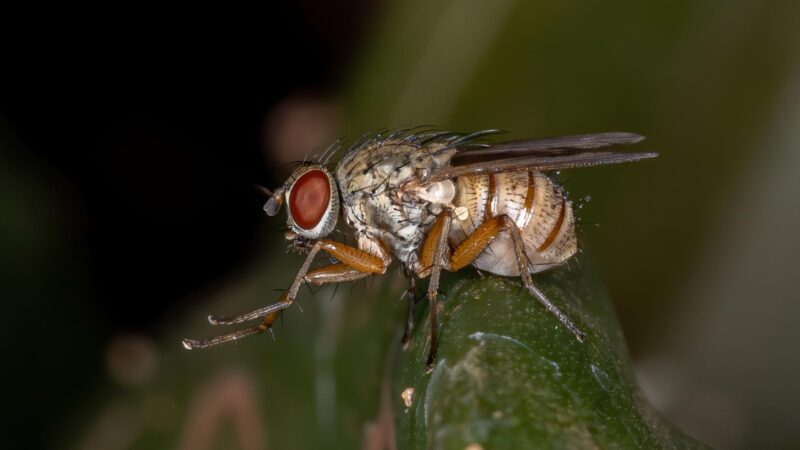
A lot of flies will enter a house due to various reasons. They are attracted to moisture, light, warmer environment, and organic matter such as dead animals, animal and human feces, and garbage.
Since flies multiply very quickly, they can easily become uncontrollable, even if only a few of them have entered your house.
How Long Does a Fly Live In Your House?
During summer, adult flies can live up to between 2 and 3 weeks in houses. But during colder temperatures, they can live up to 3 months.
As long as they have food sources in breeding sites, flies will not leave an area and will die naturally. Amazingly, they can also travel as far as 20 miles in search of food and shelter.
Do Flies Bite?
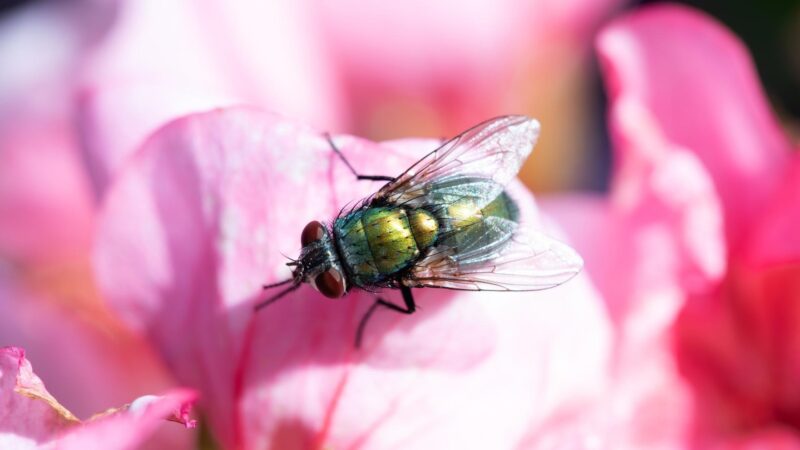
Most fly species, such as house flies and fruit flies, don’t bite humans because they have no teeth. On the other hand, some fly species will bite humans and may transmit diseases.
This includes black flies, deer flies, horse flies, sand flies, and stable flies. Fly bites can be extremely painful and can cause skin irritation.
Related: Deer Flies | Information and Control Guide
Where Do Fruit Flies Live?
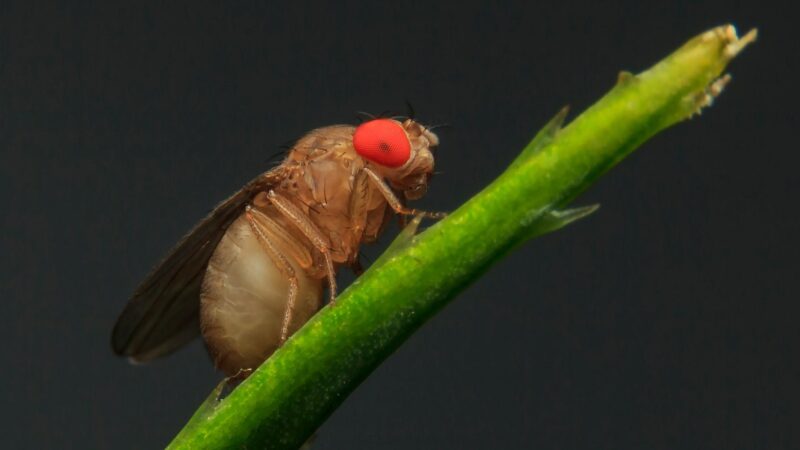
As the name implies, fruit flies mainly feed on ripened fruits. They will also eat vegetables and sweetened liquids such as fruit juice, soda, and beer and soda.
Scientifically known as Drosophila melanogaster, fruit flies live in homes, restaurants, supermarkets, and other places where these foods are present.
Do Flies Live In Chimneys?
Flies (especially blow flies) may live in chimneys if there is a dead animal trapped inside.
Since they lay eggs on their food source, larvae can also accumulate in the chimney and can cause an infestation. Aside from chimneys, flies may also live in attics, basements, and fireplaces without your knowledge.
Where Do Flies Go at Night?
Flies are generally diurnal insects. Therefore, they are active during the day and sleep at night. But instead of sleeping on the ground or floors, they prefer resting on tree branches, leaves, and twigs.
Indoors, flies will sleep at night on beams, ceilings, and walls. Nonetheless, they may also take a short nap during the day.
Where Do Flies Lay Their Eggs in a House?
When in houses, most flies lay eggs in their food source, depending on the species. Fruit flies deposited their eggs in fermenting fruits, while house flies lay their eggs in garbage, human and animal waste, or any rotting organic matter. On the other hand, blow flies lay their eggs on dead animals and open wounds.
Are House Flies Harmful to Humans?
House flies are harmful to humans but not directly. This fly species don’t bite or sting humans, but they carry bacteria and viruses that can cause several serious diseases.
This includes anthrax, cholera, dysentery, food poisoning, leprosy, poliomyelitis, tuberculosis (TB), tularemia, typhoid fever, and yaws.
Meanwhile, accidental swallowing of an adult house fly usually doesn’t cause any harm. In fact, flies are rich in protein. But if the fly is on your throat, you may find it hard to breathe.
Therefore, you should cough it out or swallow it completely. However, you might experience diarrhea if that fly is carrying lots of bacteria.
If You Kill a Fly, Will More Flies Arrive?
If you kill a fly, more of them will soon arrive. This is because dead flies will release tons of pheromones that will attract other flies.
Aside from being sexual attractants, this so-called “fly factor” can also change the behavior of animals of similar species. This is also why most glue traps have pheromones.
What Flies Hate the Most?
Like most insects, flies hate strong scents such as vinegar and some essential oils. However, very cold weather is what flies hate the most.
They will become less active and may not be able to reproduce if the temperature is below 45°F (7.2°C). But once the temperature drops to 32°F (0°C), flies will slowly die.
How to Get Rid of Flies Naturally?
Using insecticides in killing flies is not recommended. Although some of them can be effective, adult flies can easily avoid them. Maggots can hide in tiny spaces that sprays cannot reach.
Some fly species are also resistant to pesticides. So, if you want to get rid of flies, below are some natural ways that you can easily follow.
1. Clean Up Garbage
Clean up your garbage, and don’t let it accumulate. Separate leftover foods, food wrappers, kitchen waste, and animal feces from other trash.
To kill maggots, put silica gel packets or sprinkle salt and lime on your garbage cans. Empty your garbage cans regularly, and clean them with white vinegar or bleach solution.
2. Remove All Food Sources
Aside from garbage, flies eat almost anything, including rotting and fresh foods. Since flies also breed on their food sources, maggots will soon appear, and the food will be contaminated.
To avoid flies, place all food items in tightly closed containers, remove food debris, and avoid feeding your pets outside the house.
3. Use Fly Swatters
If flies are not that many, you can kill them using a durable fly swatter. Choose the one with a long handle, such as Kensizer Plastic Fly Swatters. But don’t swat them near a food preparation area. Otherwise, your food will be contaminated with insect body parts. Also, throw away dead flies immediately.
4. Turn on Electric Fans
Aside from cold weather, flies also hate fast-moving air because it prevents them from flying smoothly. This is similar to an airplane avoiding a windstorm.
So, if you are preparing food or tons of flies are flying around, turn on your electric fans. To save electricity, you can also use chemical-free fly fans such as Treva Fly Fan.
5. Trap the Flies
If flies are quite a lot, use fly traps. To make one, mix vinegar (or any kind of sweet juice or food scrap) and soap and put the mixture in a tall glass. Place the glass where flies are present.
Flies will soon be attracted to it and will get drowned. Alternatively, purchase non-toxic sticky fly traps such as Window Fly Traps.
6. Use a Vacuum Cleaner
A vacuum cleaner is effective in catching slow-moving flies. However, it will not kill adult flies at once. This is because flies don’t have lungs that will explode due to a lack of air. Instead, their metabolism will slow down and will no longer fly. Just be careful when disposing of the vacuum bag since flies might fly and escape.
7. Use Essential Oils
According to a study, some essential oils can repel adult flies and maggots. This includes essential oil extract from cinnamon, citronella, eucalyptus, lavender, neem, sunflower, tea tree, and vetiver. However, essential oils evaporate very quickly. This means that you may need to spray them from time to time.
8. Seal Possible Entries
Flies are fast fliers and can enter very tiny holes. Replace damaged screens on doors and windows, and always close them. If possible, install doors that close automatically.
For wall cracks and tiny gaps, cover them with a water-proof foam insulation sealant such as Loctite TITE FOAM Insulating Foam Sealant.
Summary
Flies may be beneficial insects, but they are still pests and can spread diseases. Therefore, you should get rid of them as soon as possible.
So far, the best way to prevent flies from entering your house is to observe cleanliness inside and outside. For a severe fly infestation, call a professional pest control service immediately.
List of Sources
House Fly, Musca Domestica Linnaeus (Insecta: Diptera: Muscidae)